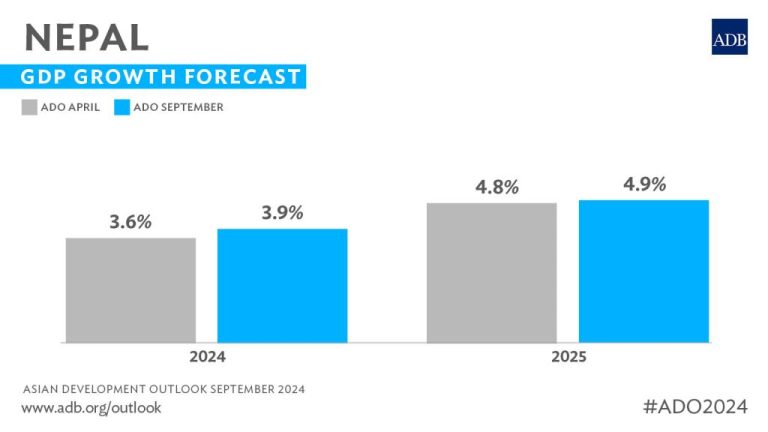Nepal’s economy is showing signs of momentum, driven by a strong stock market rebound, major energy investments, and key policy updates from the central bank. While optimism grows in the capital market and regional cooperation expands, delays in infrastructure and discontent over past leadership remain pressing concerns.
This week’s developments include a 40-point rise in NEPSE, new lending rules for cooperatives, a dramatic candlelight protest marking the end of Governor Maha Prasad Adhikari’s tenure, and the government’s push for regional economic collaboration with Thailand and BIMSTEC.
NEPSE Gains Ground as Investor Confidence Grows
Nepal’s stock market made a notable recovery this week. The NEPSE index climbed by 40.01 points, closing at 2,703.39. Trading was active across three out of four days, with weekly turnover hitting NPR 26.65 billion. Market capitalization rose by NPR 67 billion, signaling a return of investor confidence after recent liquidity concerns.
Lower borrowing costs have encouraged margin lending. Banks now offer share mortgage loans at rates as low as 6.28%, boosting stock market activity.
Gold and Silver Prices Tumble
Gold prices in Nepal dropped sharply, falling NPR 3,900 per tola to NPR 176,400, according to the Nepal Gold and Silver Dealers’ Association. Silver also declined by NPR 125, setting the new rate at NPR 1,870 per tola.
New Rules for Savings and Credit Cooperatives
In a bid to tighten financial discipline, Nepal Rastra Bank (NRB) released new guidelines limiting how much cooperatives can borrow. These entities can now borrow no more than 5% of their total assets and must stay within 100% of their capital fund.
The move is part of a broader effort to bring regulatory stability to the cooperative sector, which has faced scrutiny over risky practices in recent years.
NRB Unifies Foreign Exchange Policies
NRB’s new Unified Circular 2081 BS consolidates 29 foreign exchange provisions. It enables advance payments for imports backed by foreign guarantees and mandates insurance for shipments exceeding TT limits. The circular aims to simplify rules and enhance trust in cross-border trade.
Governor Adhikari’s Tenure Ends Amid Controversy
Outgoing NRB Governor Maha Prasad Adhikari officially ended his five-year term this week. In a farewell briefing, he emphasized autonomy and reform. However, many investors expressed frustration over his tenure.
In a symbolic candlelight protest at Bhrikutimandap, demonstrators lit candles spelling “M. OUT.” Protesters blamed Adhikari for triggering financial losses and mental health issues among retail investors. They urged that his successor be economically competent and free from political bias.
42 Hydropower IPOs Stalled by Net Worth Rules
A total of 42 hydropower companies face delays in launching their Initial Public Offerings (IPOs) due to a parliamentary requirement that firms have over 90% net worth. Industry stakeholders argue the rule is too strict, especially for early-stage firms. Talks are underway to revise the guideline and make capital markets more accessible.
Nepal Attracts Rs 86 Billion in Energy Investments
Over the last eight months, Nepal secured NPR 86.98 billion in commitments across 17 energy projects, totaling 500 MW in capacity. The largest investment went to the 166 MW Super Tamor project, backed by Crystal Power with NPR 34.59 billion in funding.
Both hydropower and solar energy projects are included, boosting Nepal’s long-term sustainability goals.
Upper Tamor to Use Tunnel Boring Machine for First Time
The Upper Tamor Hydropower Project will be Nepal’s first to use Tunnel Boring Machine (TBM) technology. Built by China Railway Engineering Company, the 8.7 km tunnel will take four years to complete at a cost of NPR 51 billion. Experts say this marks a major technological leap in Nepal’s infrastructure development.
PM Oli Pushes for Stronger BIMSTEC Ties
During the BIMSTEC Summit in Bangkok, PM KP Sharma Oli called for deeper regional cooperation based on Prosperity, Resilience, and Openness. These values align with both Nepal’s national motto and the United Nations Sustainable Development Goals (SDGs).
Oli encouraged member states to embrace trade, connectivity, and resilience in a rapidly changing global economy.
Nepal-Thailand Joint Business Council Formed
The Federation of Nepalese Chambers of Commerce and Industry (FNCCI) signed an MoU with the Thai Chamber of Commerce to establish a Joint Business Council. The agreement will enhance trade, investments, and business partnerships between the two nations.
Infrastructure Delays Hamper Progress
Despite gains in investment, project delays remain a concern:
-
The Nagdhunga-Sisnekhola Tunnel is stalled due to local protests over damaged water sources and land issues.
-
Tarigau Airport flights were cancelled due to zero passenger demand.
-
National road projects like the Kaligandaki Corridor and Karnali Corridor are behind targets.
Other Key Updates
-
Bank deposits fell by NPR 3 billion in one day, as per NRB data.
-
The Employees Provident Fund (EPF) distributed NPR 5.34 billion in profits to contributors.
-
26 cooperatives face deregistration over non-compliance with reporting norms.
-
Agricultural exports via Kakarbhitta reached NPR 17.73 billion, led by tea and cardamom.
-
The government now allows private firms to build and manage industrial zones, though uptake has been slow.
Nepal’s economy is currently in a transformational phase, with signs of market revival, energy sector growth, and efforts to improve regulation. However, to maintain momentum, transparent governance, strong leadership, and community engagement will be critical.


